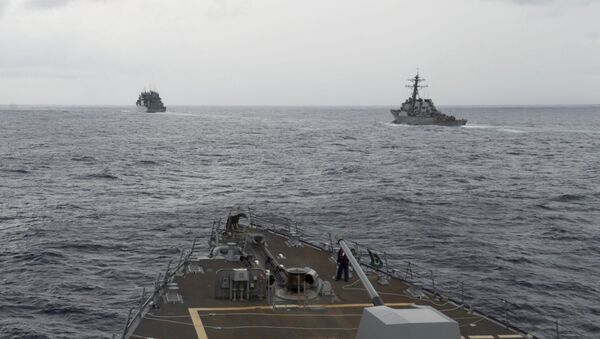US President Donald Trump’s choice to lead the Department of Defense, James "Mad Dog" Mattis, shares his boss’s approach to China, and has slammed Beijing for "shredding the trust of nations in the region." But he has also asserted that open diplomacy represents the best path forward, a statement welcomes by China. Diplomacy as a tool to solve ongoing issues in the South China Sea is "worthy of affirmation," the retired US Marine Corps general said.
The US does not "see any need for dramatic military moves at all," Mattis stated Saturday in a news conference following a meeting with Japanese Defense Minister Tomomi Inada.
— Donald J. Trump (@realDonaldTrump) November 20, 2016
The origin of Mattis’s nickname, repeated by Trump and White House director of social media Dan Scavino, has proved mysterious. Scavino deployed #MadDog in a tweet in which he quoted Mattis saying, "I don’t lose any sleep at night over the potential for failure. I cannot even spell the word." But according to the Independent Journal Review, Mattis suppressed rumors of the origin of his nickname at a recent Pentagon briefing. A Washington Examiner reporter asked Mattis his preferred name, and whether he would continue to go by “Mad Dog,” while questioning how the respected general preferred to be addressed. According to Mattis, "It’s you guys that came up with Mad Dog," he said, before laughing.
"He claimed his troops wondered where ‘Mad Dog’ came from and laughed about the nickname since his real call sign is 'Chaos,'" the IJR wrote. One outlet, Military1.com, reported Chaos stands for "Colonel Has An Outstanding Solution."
Beijing has embraced Mattis’ push for diplomacy. Affirming the value of diplomacy "accords with the common interests of China and all countries in the region," Chinese Foreign Ministry spokesman Lu Kang said. "We hope that countries outside of the region can respect the joint interests and wishes of countries in the region," the spokesman added.
One of Mattis’ other reported call signs, "Warrior Monk," may serve as a better signal of the Pentagon chief’s intentions. Mattis has pointed out that China has degraded trust between regional partners, stating that Beijing is “apparently trying to have veto authority over the security and economic conditions of neighboring states,” before asserting that independent arbitration, and not the use of armed forces, should serve as the central tool for settling disputes.



